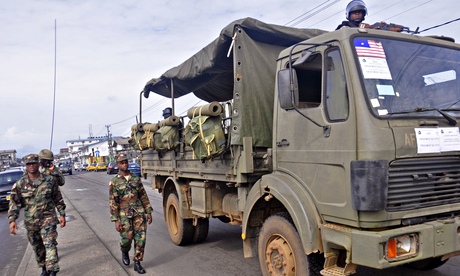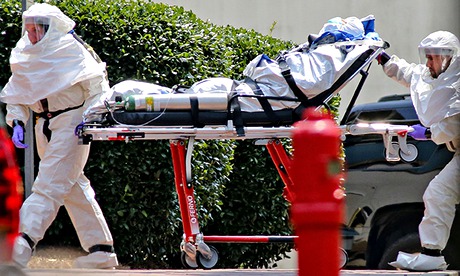
Liberian soldiers walk through streets in Monrovia in an attempt to prevent panic over Ebola. Photograph: Abbas Dulleh/AP
Hundreds of soldiers have been deployed in Sierra Leone and Liberia in an attempt to quarantine the remote villages at the centre of the Ebola outbreak, as three new cases were discovered in Nigeria and authorities in Saudi Arabia said a man was being tested for suspected infection.
The Saudi health ministry said a man in his 40s who had recently returned from Sierra Leone had shown symptoms of viral haemorrhagic fever and was being treated at a specialist hospital in the Red Sea city of Jeddah. The patient is in isolation and blood samples are being tested.
As the epidemic entered its seventh month, 700 troops in Sierra Leone began setting up roadblocks to ensure that only health personnel could move in and out of the hardest-hit communities. They include two eastern districts where health workers have sometimes been attacked by residents who fear that treatment centres are causing Ebola to spread.
Military spokesperson Yayah Brima said food and medical supplies would be ferried in by convoys, and 50 military nurses would provide medical assistance to the soldiers.
 Nancy Writebol, an aid worker from North Carolina, who was infected
with Ebola in west Africa, arrives at Emory University Hospital in
Atlanta, US.
Photograph: Sipa USA/Rex
Poor enforcement and medical practices in remote areas, combined with
high volumes of cross-border travel, have fuelled the outbreak, which
has so far claimed 887 lives. Ebola is spread through contact with the
bodily fluids of infected patients, bush meat and surfaces.
Nancy Writebol, an aid worker from North Carolina, who was infected
with Ebola in west Africa, arrives at Emory University Hospital in
Atlanta, US.
Photograph: Sipa USA/Rex
Poor enforcement and medical practices in remote areas, combined with
high volumes of cross-border travel, have fuelled the outbreak, which
has so far claimed 887 lives. Ebola is spread through contact with the
bodily fluids of infected patients, bush meat and surfaces."Border controls alone give a false sense of security," said David Heymann, a professor of infectious disease epidemiology at the London School of Hygiene and Tropical Medicine, who oversaw the global response to the Sars outbreak in 2003. "You cannot keep Ebola out using only that because people can still get to places where there aren't controls."
Alongside contact-tracing, he said, "the best defence is properly understanding how it is spread, stopping it spreading further, and making sure health workers are able to self protect with up-to-par hospital controls."
Efforts to contain the outbreak have been hampered as those on the frontline have been among the hardest hit. Both Liberia and Sierra Leone's top Ebola doctors died last month. Clinics in Liberia's capital, Monrovia, were closing their doors because doctors were too afraid to treat patients, Reuters reported.
British Airways has suspended flights to and from Liberia and Sierra Leone until the end of August to help try to contain the virus. The airline had been flying four times a week to the two countries. BA said customers with tickets on those routes were being offered refunds or the option to rebook flights for a later date.
"The safety of our customers, crew and ground teams is always our top priority and we will keep the route under constant review in the coming weeks," BA said.
In Nigeria, a doctor who treated a Liberian-American man who had travelled from Monrovia has contracted the virus, and another health worker and a third citizen who had travelled the Guinea are displaying probable signs of haemorrhagic fever, the World Health Organisation said.
A morgue in Nigeria's southern state of Anambra has been sealed while tests are carried out on a deceased person, said the health minister Onyebuchi Chukwu.
Enuka Egbon, a fruit trader in the Lagos district where eight people are being held in an isolation ward after coming into contact with the Liberian-American victim, said: "It's really scary because we have no choice but to keep going out and keep using crowded buses and shopping in markets. And Lagos is a city where there is very little breathing space."
Meanwhile, two US volunteer doctors who contracted the disease arrived in the US, where they are being treated with an experimental serum. Nancy Writebol and Kent Brantly of the charity Samaritan's Purse were said to be critical but improving after using the serum, which has been tested only on monkeys.
"Within an hour of receiving the medication, Brantly's condition was nearly reversed. His breathing improved; the rash over his trunk faded away," CNN reported, citing sources involved in the pair's treatment.
Last week the WHO said the outbreak had reached a critical point, and announced a $200m (£120m) emergency fund. On the last day of July, the latest day for which statistics are available, 163 new cases were reported, the WHO said.

No comments:
Post a Comment